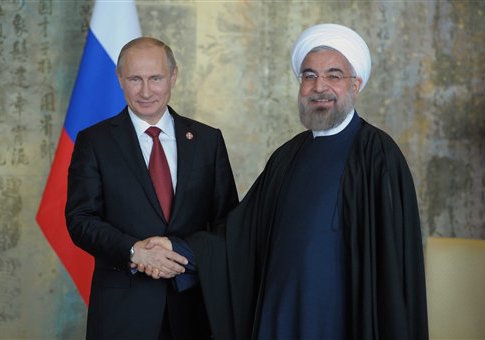Russia’s announcement on Monday that it will proceed with the sale of advanced missile systems to Iran crosses a so-called "red line" established by the Obama administration in 2010, according to comments by senior administration officials.
Following years of dissent from the United States, Russia announced on Monday that it would proceed with the sale of the advanced S-300 air defense missile system to Iran, which has been vying to purchase the hardware for years.
The announcement sparked criticism from the Obama administration, which has been pressuring Iran since at least 2010 to withhold the sale.
Russia’s previous ban on selling Tehran the powerful defense system was hailed as a coup by the Obama administration and promoted by it as an example of President Obama’s ability to rein in Russian intransigence on the military front.
However, Monday’s announcement by Russia threatens to complicate an already fractured relationship with Moscow and throw into further jeopardy the ongoing negotiations with Tehran over its nuclear program.
Experts have warned that the reversal threatens to split the international coalition currently working to halt Iran’s nuclear program—a narrative that the White House is working to downplay
The Russian executive order effectively "lifts the ban on transit of the S-300 air defense missile systems via Russian Federation territory (including by air), export from the Russian Federation to the Islamic Republic of Iran, and transfer of the S-300 to the Islamic Republic of Iran outside the Russian Federation’s territory, using ships or aircraft flying the Russian Federation flag," according to an announcement by Moscow.
Russia’s decision to arm Tehran with the S-300 system erodes a long-promoted narrative by the Obama administration about its success in preventing Russian proliferation.
One senior Obama administration official speaking in 2010 described the S-300 sale as a "red line" for the United States that "couldn’t be crossed," according to Foreign Policy.
"They’ve made that very clear to us for the last two years that this is not a symmetrical transaction for them and they don’t share the same threat assessment as us vis-a-vis Iran," the official was quoted as telling Foreign Policy in a 2010 article focused on "how the Obama team convinced Russia not to sell arms to Iran."
The White House claimed that Moscow’s decision to ban arms sales to Tehran would usher in a new era of cooperation between the United States and Russia.
"The decision was a bold one that acknowledges how important it is to us and how important [Former Russian President] Medvedev takes this reset with President Obama," the administration official said.
Obama administration officials also told Foreign Policy that it had "made clear to Medvedev and other Russian officials that the sale of the S-300 to Iran was a red line that couldn’t be crossed."
Monday’s announcement by Russia flies in the face of this purported diplomatic success and left the Obama administration scrambling to respond. Officials in both the White House and State Department declined to discuss with the Washington Free Beacon its previous declaration about Russia’s deal with Iran violating a so-called red line.
"We've seen those reports, as they relate to the possible sale of the S-300 anti-ballistic missile system to Iran," White House Press Secretary Josh Earnest told reporters on Monday.
The United States, he added, "has previously made known our objections to that sale" and did so again on Monday in private phone calls with the Kremlin.
The sale of the S-300 system to Iran could violate international economic sanctions still in place, Earnest said.
State Department spokeswoman Marie Harf said that while the sale of the S-300 to Iran would not violate United Nations Security Council sanctions on Tehran, it remains a concern to the United States.
"We don't believe it's constructive at this time for Russia to move forward with it," Harf told reporters.
"We think given Iran's destabilizing actions in the region, in places like Yemen or Syria or Lebanon, that this isn't the time to be selling these kinds of system to them," Harf explained. "So in general, that's what our concerns are based on."
Elliott Abrams, a former White House National Security Council (NSC) member, wrote that the breakdown in the Obama administration’s campaign to block the sale is yet another sign of Washington’s waning influence.
"American ‘red lines’ aren’t what they used to be, Medvedev is gone, and the ‘reset’ with Russia is an embarrassment," Abrams wrote at the Council on Foreign Relations (CFR). "So is the way the Obama administration claimed credit for changing Russia’s policy toward Iran."
